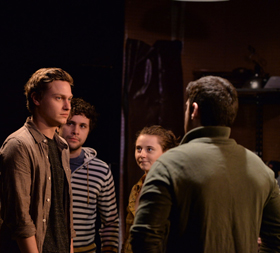
We aren't surprised in December to see a surge of plays featuring decorated evergreens and be-ribboned packages, nor do we wonder at carved pumpkins and grinning skeletons making their appearance in October. The pleasures of celebration are universal, and so festivals once associated with specific communities frequently achieve a measure of appeal beyond their original boundaries.
Who can explain Saint Patrick's Day, however? How did this Christian representative of a small island kingdom come to command such widespread veneration in the United States, eclipsing other offshore icons unrecognized outside their ancestral settlements? In our city alone, the "wearing of the green" for 2019 encompasses Chicago Shakespeare welcoming Dublin's Abbey Theater touring production of Roddy Doyle's pub comedy Two Pints, as well as the Irish Theatre of Chicago (formerly Seanachai Theatre Company) remount of Owen McCafferty's Mojo Mickeybo with Rob Kauzlaraic and Dan Waller repeating their 2009 performances. Not to be outdone, the Factory Theater is currently hosting May the Road Rise Up, a world premiere drama by company member Shannon O'Neill.
Mary Shen Barnidge: How did this play come to be scheduled at this particular time? Was it written especially for the shamrock season, or did somebody on Factory's reading committee exclaim, "Hey, I know what! Let's do this for Saint Paddy's day!"
Shannon O'Neill: That's funny! I never gave a thought to the timing until I saw our rehearsal and performance calendar. I'm of Irish and Scottish descent, myself. The Murphy clan is a nod to my heritage and also to my deep enchantment with Ireland and its traditions.
Barnidge: How has the play evolved since you began writing?
O'Neill: I started it during the lead-up to the 2016 presidential election as an exploration of the so-called "forgotten class" and how the American Dream was perceived from one generation to the next. I conceived grandfather Danny Murphy as an Irish immigrant and the play as a story of how his sacrifice and pride is viewed today—but then I heard an interview on the radio where a mother and her son recounted a horrific event occurring thirty years earlier. What haunted me afterward was the tone of their voices as they talked—as if they had exhausted every tear, every hesitation, every argument, every awkward silence. My dramatic question soon became "How does a family move forward from such a traumatic experience?"
Barnidge: Playwrights sometimes write for members of their own troupe. The play's central personnel are of Irish descent, but their circle of friends have Latino, Jewish, German and Scandinavian surnames. Did you have certain Factory actors in mind for these roles?
O'Neill: I did for my last play, Jenny and Jenni, but the characters' ages in this one would have made pre-casting from the Factory ensemble a challenge.
Barnidge: The dialects, too. Grandfather Danny and his contemporaries still retain their accents and even converse for a short time in Gaelic, which must be one of the hardest languages to reproduce aurally from a written transcript—
O'Neill: Yes, it is a very difficult language to acquire. Fortunately, we have an amazing dialect coach named Shane Murray-Corcoran.
Barnidge: How closely do you think the ethnic dynamics of the Murphy clan mirror those of other cultures?
O'Neill: The Irish are notorious for not talking about their problems—for taking their suffering with them to the grave, rather than admitting its existence. This is why I set my play at a moment when all three generations are forced to acknowledge the past and their individual pain. At its core, the story is about a family—any family—struggling under the lingering effects of a long-ago tragedy before arriving at a resolution.
May The Road Rise Up continues at Factory Theater through March 30. www.thefactorytheater.com
Two Pints plays March 6-31 at Chicago Shakespeare Company on Navy Pier. www.chicagoshakes.com
Mojo Mickeybo plays two days only, February 27-28, at the Davis cinema. www.irishtheatre.org
Mary Shen Barnidge
Contributing Writer

 Follow Us On Twitter
Follow Us On Twitter